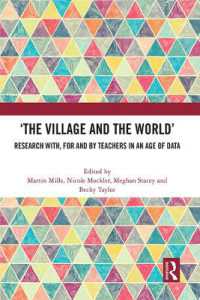Full Description
As Dominant Western Worldviews (DWWs) proliferate through ongoing structures of globalization, neoliberalism, extractive capitalism, and colonialism, they inevitably marginalize those deemed as 'Other' (Indigenous, Black, Minority Ethnic, non-Western communities and non-human 'Others', including animals, plants, technologies, and energies). Environmental Education (EE) is well-positioned to trouble and minimize the harmful human impacts on social and ecological systems, yet the field is susceptible to how DWWs constrain and discipline what counts as viable knowledge, with a consequence of this being the loss of situated knowledges. To understand the relationships between DWW and situated knowledges and to thread an assemblage of ontological views that exist in unique contexts and nations, authors in this book take up decolonizing methodologies that expand across theories of Indigenous Knowledges (IK), Traditional Ecological Knowledges (TEK), two-eyed seeing, hybridity, and posthumanism. As EE opens to emplaced and situated socio-cultural and material stories, it opens to opportunities to attend more meaningfully to planetary social and ecological crisis narratives through contingent, contextualised, and relevant actions.
Contents
List of Figures - Note from the Series Editors - Acknowledgments - Abbreviations - Janet McVittie: Decolonizing Environmental Education for Different Contexts and Nations - Zuzana Morog: A Global Assemblage - Vince Anderson: Integrating Social and Ecological Justice Inquiry - Sky McKenzie: Water Deep - Kathryn Riley: Mutually Entangled Futures in/for Environmental Education - Araceli Leon Torrijos: Ahora Adentro - Marcelo Gules Borges: Decolonial Pedagogy, Agroecology, and Environmental Education: Repositioning Science Education in Rural Teacher Education in Brazil - Alice Johnston: Taking Learning Outside - Kylie Clarke: Walking Gently ... Through a Cultural Lens ... - Roseann Kerr: Decolonizing Education for Sustainable Development - John B. Acharibasam: Decolonizing Environmental Education in Ghana - Elsa McKenzie: Earth Sorrow - Janet McVittie/Marcelo Gules Borges: Naturalized Places, Indigenous Epistemology, and Learning to Value - Ranjan Datta: Environmental Education through Indigenous Land-Based Learning - Julio Karpen: Escolas Marginalizadas e Educação Ambiental/Marginalized Schools and Environmental Education - Kai Orca: "From the Stars in the Sky to the Fish in the Sea" - Epilogue - About the Authors - Index.







